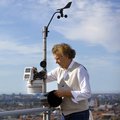Archive
30 November 2022
Research from TU Delft in the Rijksmuseum

A smart alternative to the traditional sandbag and an experiment with clay to learn more about strengthening dikes. These are two examples of TU Delft research that is currently being exhibited as art at the Rijksmuseum.
21 November 2022
Refreeze the Arctic Foundation supports climate research at TU Delft

On 21 November 2022, Delft University Fund signed a multi-year grant agreement with the Refreeze the Arctic Foundation. This will enable the development of innovative methods at TU Delft to modify clouds to combat global warming.
18 November 2022
Christian Tiberius in het NRC: Plaatsbepaling tot op 10 cm precies

Plaatsbepaling met gps is in de praktijk niet heel nauwkeurig. Het kan beter, door geen satellieten maar 5G-masten te gebruiken.
17 November 2022
Roderik Lindenbergh & Mieke Kuschnerus laser scan data set of Kijkduin

Nature Portfolio’s Scientific Data Journal published an article written by Sander Vos, Katharina Anders, Mieke Kuschnerus, Roderik Lindenbergh, Bernhard Höfle, Stefan Aarninkhof and Sierd de Vries, that describes a 6 month long hourly laser scan survey of the beach-dune system at Kijkduin, The Netherlands. The Netherlands is protected by about 250 kilometers of natural beach-dune systems and understanding the natural variability and resilience is of key importance to protect the Netherlands with the future climate change and sea level rise. The dataset provides information about storm responses and shoreward sand transport which is important for the resilience determination.
16 November 2022
A navigation system with 10 centimetres accuracy

Researchers of Delft University of Technology, Vrije Universiteit Amsterdam and VSL have developed an alternative positioning system that is more robust and accurate than GPS, especially in urban settings. The working prototype that demonstrated this new mobile network infrastructure achieved an accuracy of 10 centimeter.